Backroads and Ballplayers #14
Stories of the famous and not-so-famous men and women from the days when baseball was "Arkansas' Game." Always free and always short enough to finish in one cup of coffee.
Hard Times and Hardball Arrives
Hard Times and Hardball book signings and preview
My second book, Hard Times and Hardball will be available in several locations beginning Saturday, July 15. On that date, I will begin offering signed/mailed copies on my website, but I would much rather see you in person. I will be at the Petit Jean Coffeehouse on Saturday morning July 15, from 9:30 AM until 11:00 AM. (Link to ordering information located at the end of this post)
The following Saturday, July 22, I will sign books at Newton’s Pharmacy in Russellville, where Billy Newton and I operated a baseball card shop 35 years ago. The time for that signing will also be 9:30 AM - 11:00 AM.
Late additions to the signing schedule:
I will make a presentation and sign books on July 17 at the Yell County Historical Society, - Presentation “When Baseball was Arkansas Game”
7:00 PM, Methodist Church Family Activity Center at 119 Locust Street in Dardanelle. Everyone is invited!! Guests Welcome
July 24, 7:00 PM at a meeting of the White County Historical Society. The meeting will take place at the Carmichael Community Center at 801 S Elm in Searcy and GUESTS ARE WELCOME. “When Baseball was Arkansas’ Game.”
We are pleased to offer the book at the lowest possible cost. Hard Times and Hardball contains 60+ chapters and more than 420 pages. At these in-person signings, the book will sell for $18.
I am proud of this book. Not because of my writing ability, but because these stories of our baseball heritage deserve to be recorded. Baseball was our grandparents’ game and it offered an escape from some of our state’s darkest days.
I am a big fan of author Joe Posnanski. Like Joe, I like to write in essay style with each chapter a stand-alone piece that can be read in a single sitting. Some stories are about remarkable teams, others feature the men and women whose collective biographies tell a story of determination and a shared love of the game.
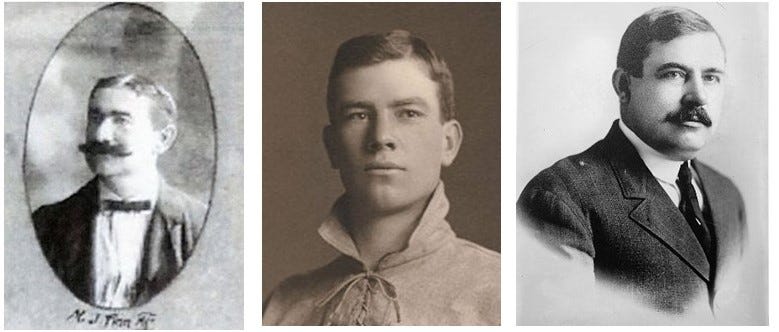
Hard Times and Hardball will take readers from the early years of the 20th century when poorly financed minor leagues in Arkansas seldom completed their full schedule, through the hard times of World Wars, a Great Depression, and numerous natural disasters, to the 1960s when the route to the major leagues no longer ran through the cow-pasture ball fields of rural Arkansas.
Along the way, Arkansas’ Baseball Hall of Famers are featured, but readers also meet young men (and women) who never achieved widespread fame, but whose story is important to our state’s baseball heritage.

For every Arky Vaughan, there is an Arky Biggs, and for every Dizzy Dean there is a Bill Bailey. George Kell had a Hall of Fame career, but just down the road from Kell’s hometown, McCrory’s Thorpe Hamilton quietly played the game without national notoriety but with the respect of his teammates and the affection of his hometown.
The 1920 Little Rock Travelers, Arkansas’ first pennant-winning team, is featured as well as the 1934 and 1935 World Series, with Arkansas country-boy pitchers taking center stage. Hard Times and Hardball contains 17 chapters on the “Greatest Generation” of Arkansas baseball from 1930 to the end of World War II.

Beginning roughly in the 1950s the makeup of major league baseball began to change. Jackie Robinson’s debut with the Dodgers opened the game to talented men of color who had been denied the opportunity to display their skills on baseball’s biggest stage. For some, it was too late, but the arrival of talented African American players changed the game forever. Some of these pioneers are featured in Hard Times and Hardball.

The 1960s saw the end of the days when young men from semi-pro teams, and town-team backgrounds were prominent in the big leagues. Baseball was no longer a country boys game and Arkansans like Stephen’s Dick Hughes were the last stars from the backroads of rural baseball. Hard Times and Hardball contains 20 stories of these days of transition from a rural game to the sophisticated preparation required to play today at a major league level.
Hard Times and Hardball also boasts of an All-Star lineup of contributors who wrote chapters on one of their special interest areas from Arkansas baseball history.
Top Left to Right: Jim Rasco - George Kell (pictured with Margaret Rasco Dearing, left and Jim Rasco, right), Johnny Mullens - Johnny Sain, and Dr. David Jerome - Mel Wright (pictured left with Bill Virdon)
Center Left to Right: Dr. Bob Reising - Tommy McCraw, Caleb Hardwick - Booker McDaniel, Bill Pruden - Ray Winder Field, and Dr. Fred Worth - “Final Chapter”
Bottom Left to Right: Scott Goode - Preacher Roe, Madison McEntire - Introduction (pictured with Will McEntire of the Arkansas Razorbacks), Ronny Clay and Joe Miles - Mid Earp AAGPBL, and Jamin Ross - Pine Bluff Judges
Our Grandpa’s Game
They played on Sunday in a cow pasture or a vacant lot. They listened on their battery-powered radios even before they had electricity, and, almost unanimously, they followed the St. Louis Cardinals. Baseball was Arkansas’ game when our ancestors needed it most. It was our grandpas’ game and an integral part of the lives of Arkansans who endured our state’s most difficult years. Arkansas was basically a rural state for much of the early 1900s, and baseball was part of the summer routine. Three acres, a ball, and a bat were all it took to play, and every community had a town team. Arkansans from this era grew up in hard times.
They endured two world wars, a pandemic, a historic flood, a devastating drought, and a Great Depression. Baseball was an escape, and they loved the game. They attended their big-league baseball games on the radio. Although they had never seen Sportsman’s Park in St. Louis, they imagined what it looked like. It was green and symmetrical, not unlike the converted pasture where they played on Sunday.
Our ancestors had never seen Dizzy and Paul in person, although most knew someone who had. They knew Diz was tall and lanky, with a shock of unruly dark hair. His uniform didn’t fit quite right, and he had a quick country grin. A lot of young men in their community looked like that. They sat on green benches on the courthouse lawn and talked about Stan Musial. In their playing days, they had tried to emulate his stance. He batted left-handed, hunched in an awkward slouch, with his bat pointed straight up. They had seen it on the radio.
Our grandpas told us about Musial’s heroics and Enos Slaughter’s mad dash from first base to score the winning run in the 1946 World Series. Some claimed to have met the great Lon Warneke, he was a county judge down in Garland County. They compared Bob Gibson to Ole Lon. Most declared Warneke was better. After all, they were there, listening on the radio when he pitched for the Cards.
Most of our grandpas played. Many played better in their memories. Some told of playing some pro baseball, and many of them actually did. It was a way to make a living when a job playing a boy’s game was preferable to a coal mine or a struggling farm. As of the completion of the 2022 season, 221 Arkansas-born men had played major league baseball. Seventy-three percent of those Arkansans who reached baseball’s highest level (162) were born before World War II. The stories of those days in Arkansas baseball are fading and somewhat muddled in the retelling. But they remain not only stories about a game but also about our heritage. I began telling those stories simply because I liked them, but now my friends and I believe the history of these men (and women) is an important part of our Arkansas heritage. We hope you agree.
Ordering and Book Signing Information
If you are a new subscriber or you have missed some posts click here.




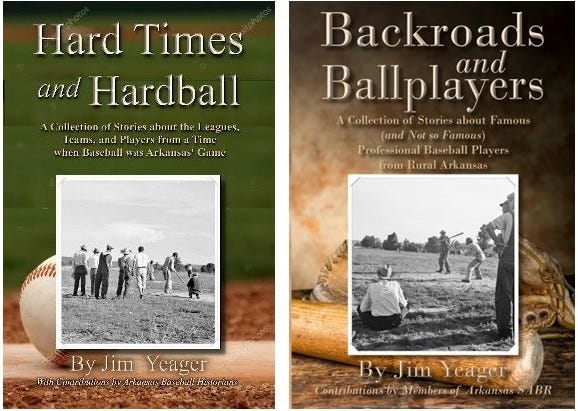
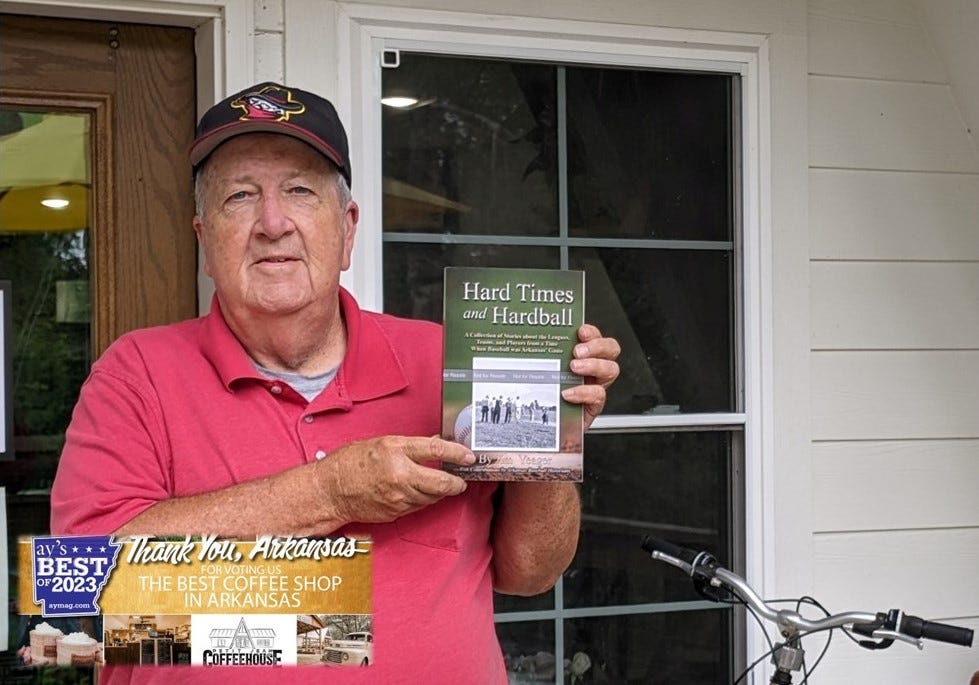
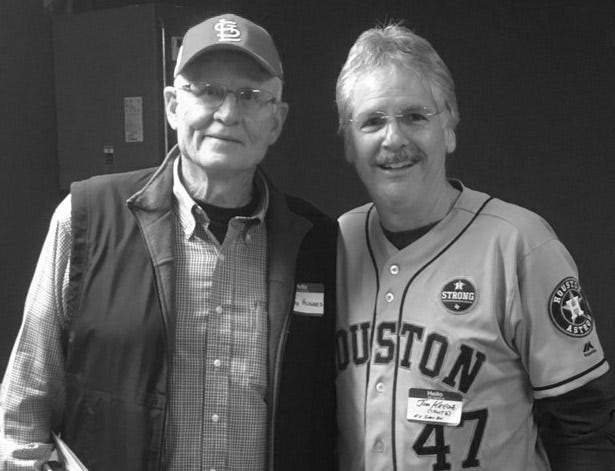
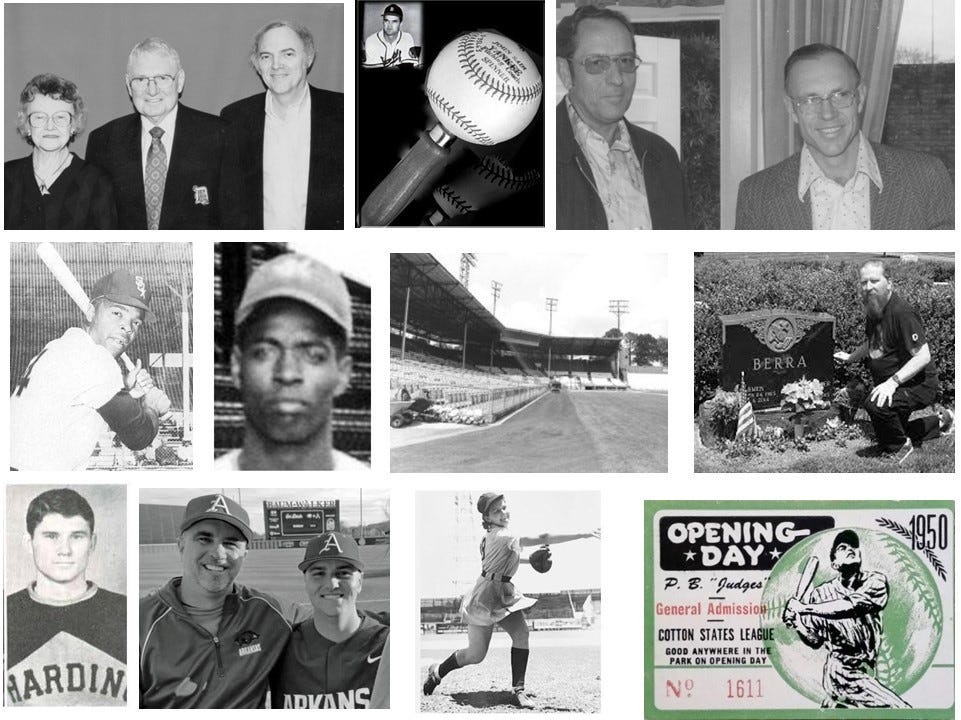
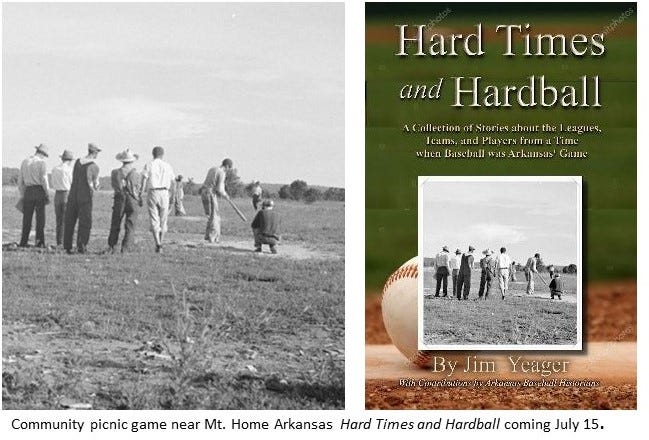
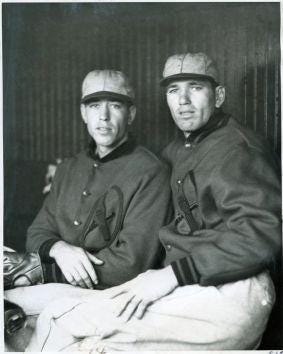

Looking forward to reading it! Do you plan to be at the SABR meeting next month, and if so, will you have copies available there?